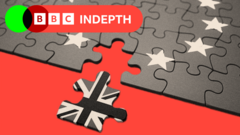In a significant political shift, Portugal's center-right coalition emerged victorious in a snap election; however, it fell short of a decisive majority, primarily due to the hard-right Chega party's notable surge.
Portugal's Center-Right Coalition Wins Snap Election Amid Chega's Rise

Portugal's Center-Right Coalition Wins Snap Election Amid Chega's Rise
Portugal's governing coalition secures victory but lacks majority as hard-right party Chega significantly increases support.
As Prime Minister Luís Montenegro leads a minority government following the election results, the increasing influence of Chega marks a turning point in the country’s political landscape.
Portugal’s governing center-right coalition, led by Prime Minister Luís Montenegro, won a snap election held on Sunday but failed to achieve a majority due to a marked rise in support for the hard-right Chega party. While the outcome is not expected to shift the country's leadership dramatically, experts agree that Chega's performance solidifies its emergence as a formidable force in Portuguese politics, which had previously resisted far-right movements.
Political analyst António Costa Pinto declared Chega to be the “real winner” of the electoral battle. Initial results revealed Montenegro's Democratic Alliance secured approximately 32% of the votes, while the center-left Socialist Party followed closely at around 23%, with Chega trailing at roughly 22%. Although most ballots were counted, a few overseas votes remain that could impact the final standings.
Montenegro’s government has consistently rebuffed any notion of forming alliances with the Chega party, and political experts suggest that Portugal is bracing for another period of instability under a minority government. Chega, meaning "enough" in Portuguese, made history as the first hard-right party to gain traction since the fall of the Salazar regime and has leveraged discontent surrounding immigration and economic issues to bolster its support.
The snap election was prompted by a parliamentary vote of no confidence that ousted Montenegro's administration earlier this year. Preceding this, the government already faced challenges due to a small parliamentary majority and controversies tied to Montenegro's business dealings. Following a noteworthy 18% of the vote in the previous year, Chega's advance this time reflects its strategy of addressing concerns over immigration and promising stricter policies to establish law and order.
Tiago Carrasco contributed reporting from Lisbon. Emma Bubola is a Times reporter stationed in Rome.
Portugal’s governing center-right coalition, led by Prime Minister Luís Montenegro, won a snap election held on Sunday but failed to achieve a majority due to a marked rise in support for the hard-right Chega party. While the outcome is not expected to shift the country's leadership dramatically, experts agree that Chega's performance solidifies its emergence as a formidable force in Portuguese politics, which had previously resisted far-right movements.
Political analyst António Costa Pinto declared Chega to be the “real winner” of the electoral battle. Initial results revealed Montenegro's Democratic Alliance secured approximately 32% of the votes, while the center-left Socialist Party followed closely at around 23%, with Chega trailing at roughly 22%. Although most ballots were counted, a few overseas votes remain that could impact the final standings.
Montenegro’s government has consistently rebuffed any notion of forming alliances with the Chega party, and political experts suggest that Portugal is bracing for another period of instability under a minority government. Chega, meaning "enough" in Portuguese, made history as the first hard-right party to gain traction since the fall of the Salazar regime and has leveraged discontent surrounding immigration and economic issues to bolster its support.
The snap election was prompted by a parliamentary vote of no confidence that ousted Montenegro's administration earlier this year. Preceding this, the government already faced challenges due to a small parliamentary majority and controversies tied to Montenegro's business dealings. Following a noteworthy 18% of the vote in the previous year, Chega's advance this time reflects its strategy of addressing concerns over immigration and promising stricter policies to establish law and order.
Tiago Carrasco contributed reporting from Lisbon. Emma Bubola is a Times reporter stationed in Rome.




















